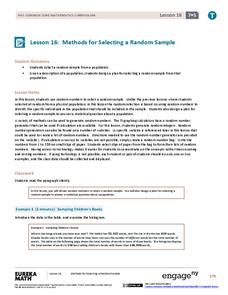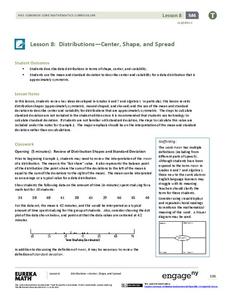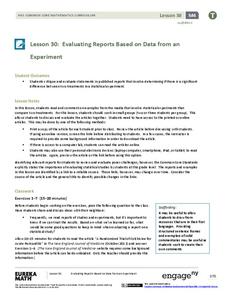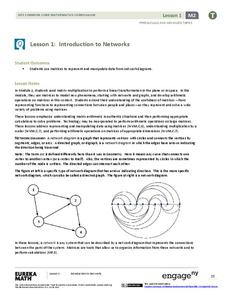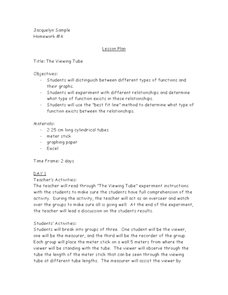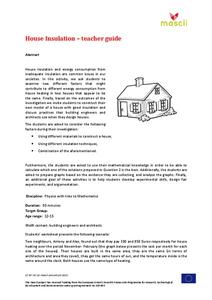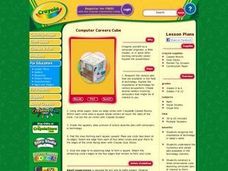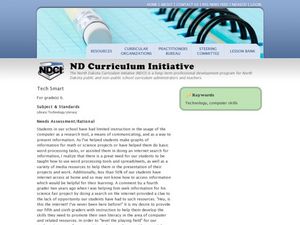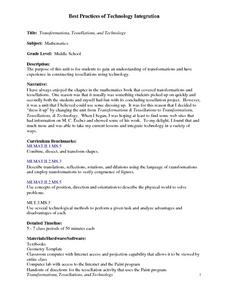EngageNY
Methods for Selecting a Random Sample
Random sampling is as easy as choosing numbers. Teams use random numbers to create a sample of book lengths from a population of 150 books. The groups continue by developing a technique to create samples to compare from two populations...
EngageNY
Directed Line Segments and Vectors
Investigate the components of vectors and vector addition through geometric representations. Pupils learn the parallelogram rule for adding vectors and demonstrate their understanding graphically. They utilize the correct notation and...
EngageNY
Understanding Box Plots
Scholars apply the concepts of box plots and dot plots to summarize and describe data distributions. They use the data displays to compare sets of data and determine numerical summaries.
EngageNY
Sampling Variability in the Sample Proportion (part 1)
Increase your sample and increase your accuracy! Scholars complete an activity that compares sample size to variability in results. Learners realize that the greater the sample size, the smaller the range in the distribution of sample...
EngageNY
Solving Logarithmic Equations
Of course you're going to be solving an equation—it's algebra class after all. The 14th installment of a 35-part module first has pupils converting logarithmic equations into equivalent exponential equations. The conversion allows for...
EngageNY
Distributions—Center, Shape, and Spread
Data starts to tell a story when it takes shape. Learners describe skewed and symmetric data. They then use the graphs to estimate mean and standard deviation.
EngageNY
Sampling Variability in the Sample Mean (part 2)
Reduce variability for more accurate statistics. Through simulation, learners examine sample data and calculate a sample mean. They understand that increasing the number of samples creates results that are more representative of the...
EngageNY
Evaluating Reports Based on Data from an Experiment
They say you can interpret statistics to say what you want them to. Teach your classes to recognize valid experimental results! Pupils analyze experiments and identify flaws in design or statistics.
EngageNY
Introduction to Networks
Watch as matrices break networks down into rows and columns! Individuals learn how a network can be represented as a matrix. They also identify the notation of matrices.
EngageNY
Estimating Probability Distributions Empirically 1
What if you don't have theoretical probabilities with which to create probability distributions? The 11th installment of a 21-part module has scholars collecting data through a survey. The results of the survey provide empirical data to...
Code.org
Controlling Memory with Variables
Not all variables are created equal. Discover how variables in computer science are different from variables in math class. Scholars learn to work with variables in computer programming by developing a mental model for how variables...
Curated OER
The Viewing Tube
Looking for an excellent lesson plan that incorporates math, science, and technology? Groups of three students use a viewing tube to perform an experiment, and discover how to organize their data into an Excel spreadsheet. This is...
Mascil Project
House Insulation
Make sure your house is warm in the winter. Pupils analyze graphs of heating costs for two similar houses and make hypotheses for why the costs differ. They then build models of houses with appropriate insulation to reduce heating costs.
Tech Museum of Innovation
Hoop Glider Design Challenge
The fourth installment of a five-part unit has young engineers designing and testing hoop gliders. They adjust the ratio of the front loop and back loop of the glider to determine the best design for the longest flight.
Curated OER
The Science and Technology of Food
Students examine the guidelines the United States Department of Agriculture places on food. In groups, they create a list of the foods they consume and discuss the political and environmental implications of purchasing the food. They...
Curated OER
A Vacation Expedition: Universal Design and Differentiated Instruction Lesson
Students plan a vacation to either a mountain, deep-sea location, rainforest or to the moon. For this vacation planning lesson, students research information about the location of their choice. They watch video clips on the SMARTBoard,...
Curated OER
The Great Egg Roll Online Project
Eighth graders decorate plastic eggs and measure how far they can roll them. They reinforce math skills involving estimation, measurement, and averaging. They record their results online and compare their results with those of students...
Teach Engineering
The Advantage of Machines
Show your students how to make their work easier. The first lesson plan in a series of 10 introduces the class to work and the way simple machines can be make work easier. The simple machines scholars can find in everyday items are...
Curated OER
Trip to the Greenbrier
Tenth graders explore the Greenbriar Resort. In this budgeting lesson, 10th graders plan and calculate the cost of trips from their home to the Greenbriar Resort.
Curated OER
Computer Careers Cube
Students use the internet to research the types of careers in technology. Using construction paper, they draw themselves in one or two of the careers they found interesting. To end the lesson, they share their drawings with the class and...
Curated OER
Technology Integration Lesson Plan: Music Database
Eighth graders gather information on fifteen of their favorite songs, create database with fields representing different attributes, explore and sort their databases, and create charts and graphs showing amount of play time vs. popularity.
Curated OER
Tech Smart
Sixth graders practice computer skills. In this technology lesson, 6th graders use programs such as Microsoft Word, Excel, Print Shop, and PowerPoint. They use the Internet for research and data collection to be incorporated in their...
Curated OER
Mirror, Mirror on the Wall, Who Needs Math in Life at All?
Students think and talk about the ways in which they use math throughout the day. They add each way to a "math in real life" bulletin board and reflect in writing on the ways they use math.
Curated OER
Transformations, Tessellations, and Technology
Students complete a unit about transformations and tessellations. They explore various tessellation websites, determine which shapes tessellate, complete a log about which website activities they complete, and create a tessellation...
Other popular searches
- Math Technology Lesson Plans
- Technology Math Lesson Plan
- Math Lessons Using Technology
- Math Lessons With Technology
- Math Lesson Using Technology


